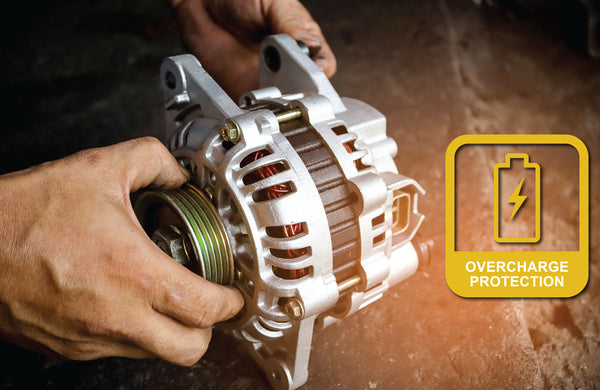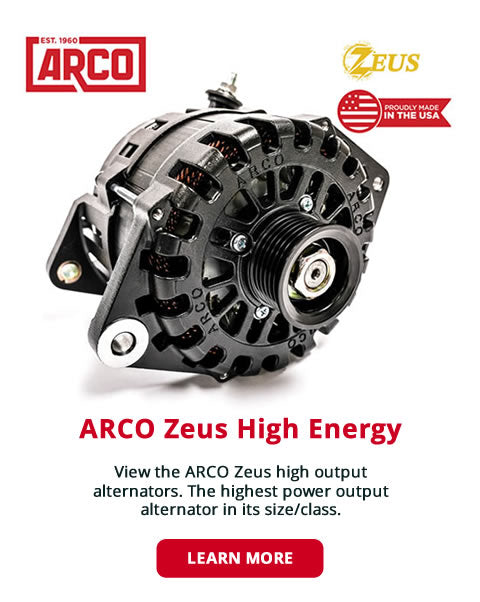
What Causes a Boat or RV Alternator Regulator to Output Too Much Current?
Can an alternator regulator damage your electrical system in your boat or RV by outputting too much current?
Reliable and easy to use alternator regulators are key when deciding energy output from your alternator to your battery. Up to this point there have only been 2 primary external regulators that could be set in deciding energy output from the alternator to the batteries, however neither of those 2 options would enable you to make changes in real time without connecting to the regulator itself. Fortunately, ARCO’s Zeus high-energy alternator regulator was designed for users to have an easy way of safely controlling their output. At the end of this article, you will walk away with a solid understanding of what has caused alternator regulators in the past to output too much current.
An alternator regulator is a device that controls the output voltage of an alternator by controlling the power to the field. It is responsible for ensuring that the voltage output is within a safe range for the battery and other electrical components in the vehicle/boat.
In some cases, the regulator may output too much current. This can damage the alternator, the battery or other electrical components in your vehicle/boat. To prevent any possibility of providing too much output, ARCO designed Zeus, the high energy alternator regulator to have safety features such as max charge settings and generator mode override when out of neutral. This article will discuss the causes of an alternator regulator outputting too much current or voltage, as well as the symptoms and consequences of these problems. We will also provide tips on how to prevent it from happening.
Too much demand from the alternator:
The field wire is a conductor that carries current from the regulator to the rotor of the alternator. The rotor is a rotating electromagnet that generates the electrical current that the alternator produces. The amount of current flowing through the filed wire controls the strength of the magnetic field in the rotor, which in turn controls the output voltage & current of the alternator.
In a typical stock alternator regulator, the field wire is connected to a control circuit that monitors the output voltage of the alternator. If the output voltage is too low, the control circuit increases the current flowing through the filed wire. This strengthens the magnetic field in the rotor, which increases the output voltage & current of the alternator.
What Happens in Bulk Charging Batteries?
When the alternator is in bulk charging mode, the control circuit keeps the field wire at 100% field. This ensures that the alternator produces the maximum amount of current possible to charge the battery as quickly as possible.
However, if the alternator is not designed for constant duty operation, keeping the field wire at 100% field can cause the alternator to overheat and burn out. This is because the alternator is working harder than it is designed to work.
In addition, if the battery is not able to handle the maximum current output of the alternator, it can damage the battery. If a lead acid battery is charged at too high a current, it can lead to grid and plate damage inside the battery and lead to premature failure.
In the case of LiFePo4 batteries the manufacturer’s max recommended charge current needs to be followed or the BMS may be damaged. Another consequence of over-current in LiFePo4 batteries can cause the BMS to be unable to balance the cells, which can lead to a premature charge disconnect and a voltage spike.
Here are some tips to help prevent an alternator regulator from outputting too much current:
- Use an external regulator that allows you to set the maximum current output.
- Monitor the output voltage of the alternator regularly and make sure that it does not exceed the manufacturer's specifications.
- Have the alternator and battery inspected and tested regularly by a qualified mechanic or electric systems technician.
Not configuring your regulator to the deep-cycle lead acid battery chemistry
Deep-cycle lead acid batteries are designed to be discharged and recharged many times. They are commonly used in applications where a lot of power is required for a long period of time.
Deep-cycle lead acid batteries have a maximum recommended charge current. This is the amount of current that the battery can safely handle without being damaged. If the battery is charged with too much current, it can overheat, suffer grid corrosion and be damaged.
The alternator regulator is responsible for controlling the amount of current that flows to the battery. If the alternator regulator is not properly set, it can output too much current, even if the battery is not fully discharged. This can damage the battery and shorten its lifespan.
To prevent the alternator regulator from outputting too much current, it is important to make sure that the battery is properly matched to the alternator and that the alternator regulator is set correctly.
Here are some specific examples of how deep-cycle lead acid batteries can contribute to an alternator regulator outputting too much current:
- If the battery is deeply discharged, it will require a higher charge current than normal. If the alternator regulator is not set correctly, it may output too much current, even if the battery is not fully discharged.
- If the battery is old or damaged, it may not be able to handle the maximum current output of the alternator. This can also cause the alternator regulator to output too much current.
- If the alternator is not properly matched to the battery, it may not be able to provide the correct amount of current to charge the battery safely. This can also cause the alternator regulator to output too much current.
Relying on an external regulator that does not allow for max charge settings for your LifePO4 batteries.
LifePO4 batteries, also known as lithium iron phosphate batteries, are a type of lithium-ion battery that is becoming increasingly popular due to their safety, long-term cost benefits, long lifespan, high discharge rate & fast efficient charging.
LifePO4 batteries have a lower internal resistance than lead-acid batteries, which means that they can accept more current without overheating. However, they also have a lower maximum recommended charge current than some lead-acid batteries. This is due to the internal BMS.
If an alternator regulator is not properly set, it can output too much current to a LifePO4 battery. This can cause the BMS to overheat and not be able to keep the cells in balance.
To prevent an alternator regulator from outputting too much current to a LifePO4 battery, it is important to make sure that the regulator is set correctly. The regulator should be set to a maximum current that is lower than the battery's maximum recommended charge current.
It is also important to use an external regulator that allows you to set the maximum current output. This will give you more control over the amount of current that flows to the battery and help to prevent it from being damaged.

Conclusion
In conclusion, understanding the potential causes and consequences of an alternator regulator outputting too much current is crucial for safeguarding the integrity of your vehicle's electrical system. An alternator regulator plays a pivotal role in maintaining the appropriate voltage output for the battery and other components. However, excessive current output can lead to serious damage, affecting the alternator, battery, and other critical elements. The innovation of safety features like ARCO's Zeus, with its meticulous design incorporating max charge settings and generator mode override, underscores the importance of addressing this issue. Through a comprehensive examination of various factors such as demand from the alternator, battery chemistry compatibility, and proper regulator configuration, steps can be taken to prevent the occurrence of this detrimental situation. By adhering to these preventive measures, you can ensure the longevity and efficiency of your vehicle's electrical system, avoiding costly repairs and preserving your investment.
If you are considering an alternator regulator to charge your Boat or RV batteries, you would be interested in our other educational articles within our learning center here.


